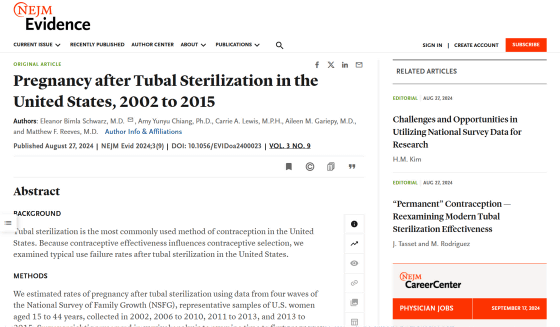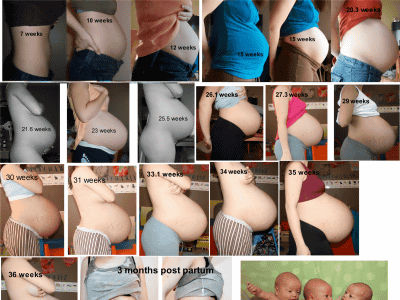It turns out that the chances of a woman becoming pregnant after undergoing tubal sterilization are 'much higher than many people think'

Pregnancy after Tubal Sterilization in the United States, 2002 to 2015 | NEJM Evidence
https://evidence.nejm.org/doi/10.1056/EVIDoa2400023

What Are the Chances You'll Get Pregnant After a Tubal Ligation? | UC San Francisco
https://www.ucsf.edu/news/2024/08/428281/what-are-chances-youll-get-pregnant-after-tubal-ligation
Having Your Tubes Tied May Not Be as Reliable For Birth Control as You Think : ScienceAlert
https://www.sciencealert.com/having-your-tubes-tied-may-not-be-as-reliable-for-birth-control-as-you-think
In the United States, where access to abortion services is restricted in several states, tubal sterilization is gaining attention as a permanent method of contraception. According to national statistics, 21% of women aged 30-39 and 39% of women aged 40 and over have undergone tubal sterilization. Tubal sterilization is particularly common among low-income women and women with chronic illnesses.
The American College of Obstetricians and Gynecologists advises patients that the chance of conceiving after tubal sterilization is less than 1%, and in many cases, patients realize they no longer need to use contraception.
However, the American College of Obstetricians and Gynecologists' figures are based on studies conducted in the late 20th century, and the actual figures may differ. If a woman becomes pregnant despite having undergone tubal sterilization, the impact on the mother, her unborn child, and the child that was aborted is serious.
Therefore, a research team led by Professor Eleanor Bimla Schwartz of the University of California, San Francisco analyzed data from the National Survey of Family Growth (NSFG) collected from women living in the United States in 2002, 2006-2010, 2011-2013, and 2013-2015. Of the subjects across the four data collection periods, 4,184 had undergone tubal sterilization.

The analysis showed that the probability of becoming pregnant after tubal sterilization varied depending on the four data collection periods, but overall, 2.9% to 5.2% of participants became pregnant after undergoing tubal sterilization.
Even in the most recent group, for which data was collected between 2013 and 2015, 2.9% of women became pregnant within the first 12 months after surgery. The estimated probability of becoming pregnant within 120 months (10 years) after surgery was a staggering 8.4%.
The results of this study suggest that tubal sterilization is not the best way to prevent pregnancy. In fact, women who use hormonal
'When choosing the right method for you, people consider a variety of factors, including safety, convenience and rapid effectiveness,' Schwartz said. 'For those who choose permanent contraception, finding out they're pregnant can be very distressing, but unfortunately, this turns out to be quite common.'

Related Posts:
in Science, Posted by log1h_ik







